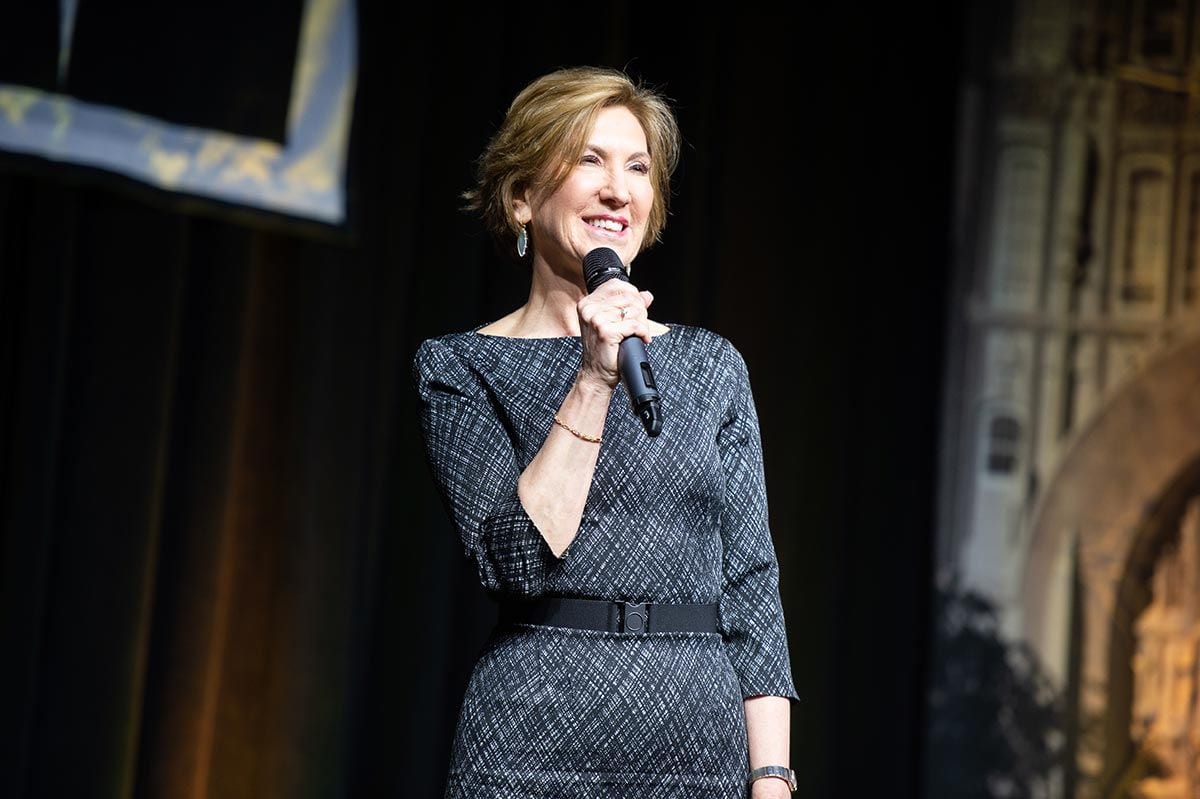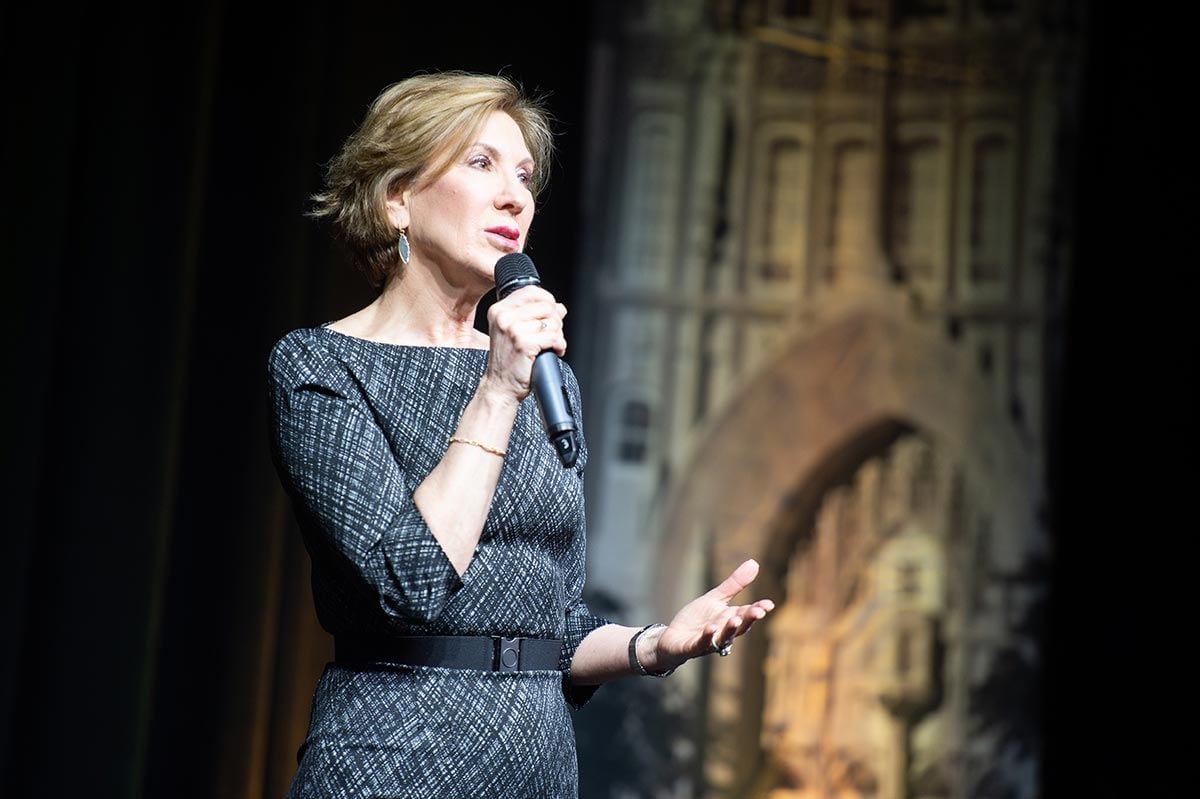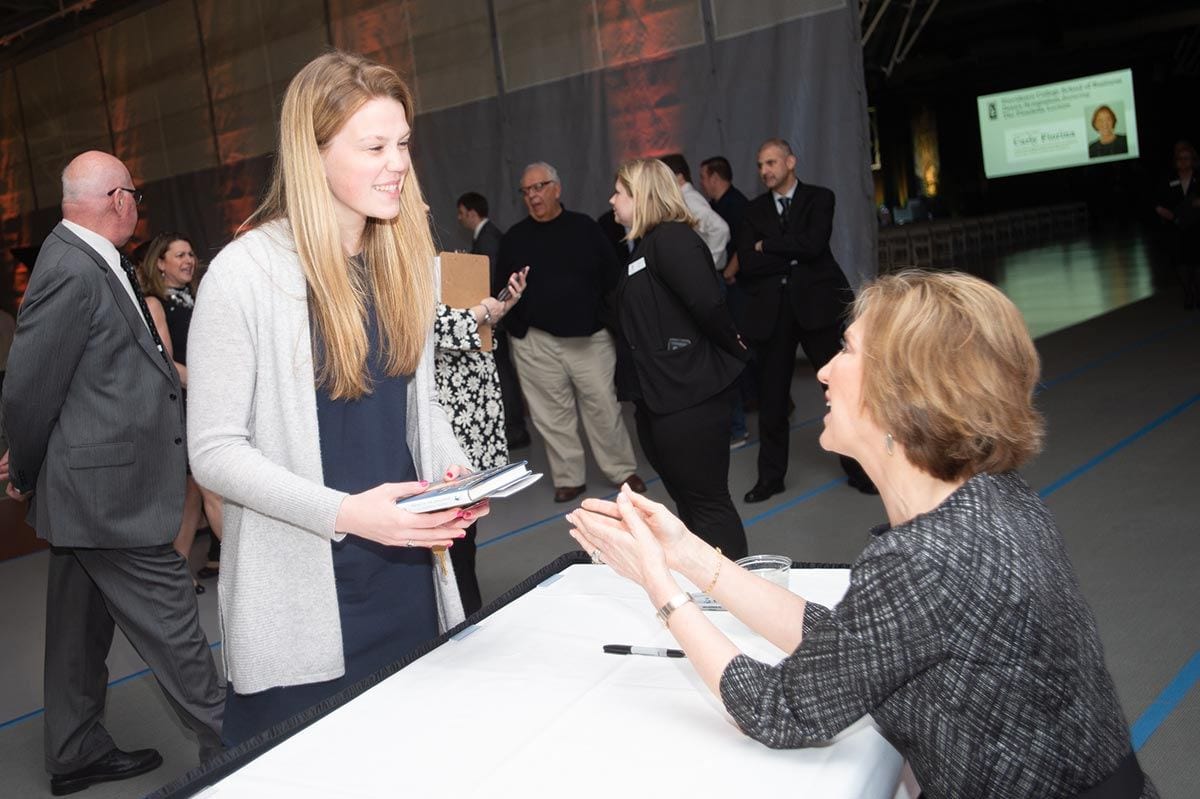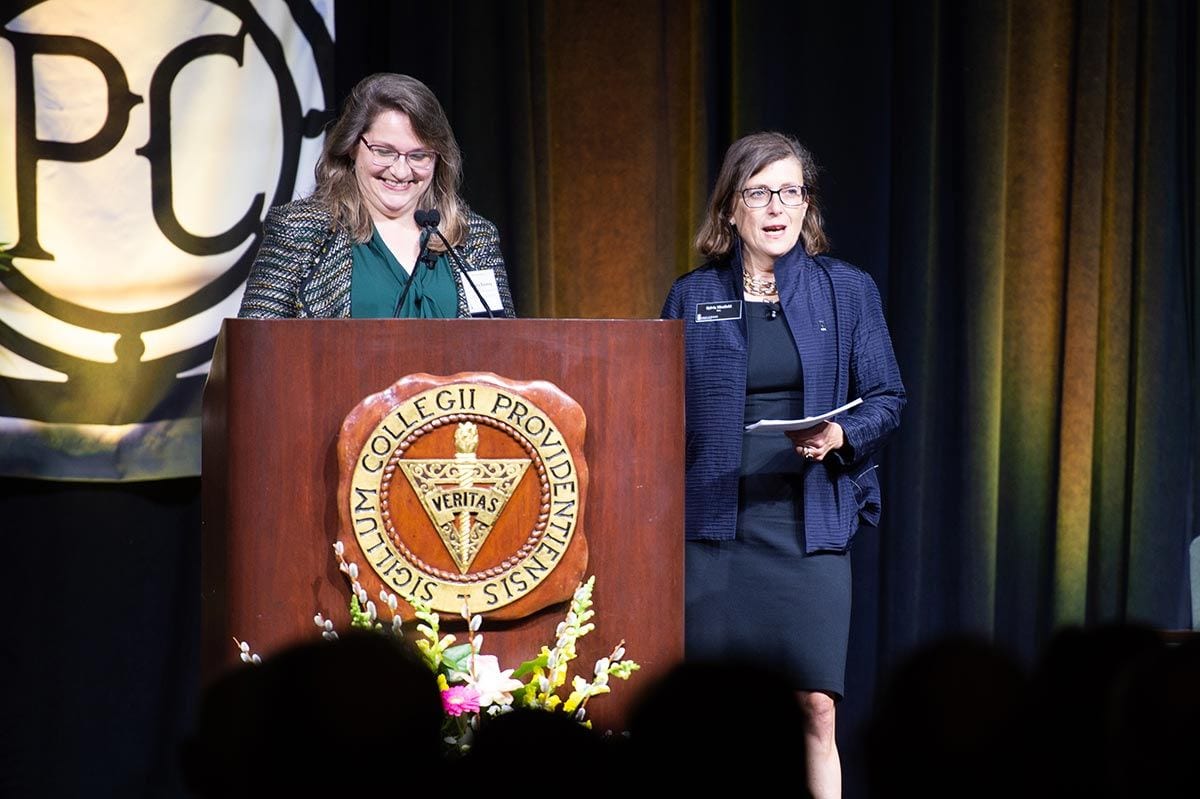Former CEO Carly Fiorina inspires students with lecture on leadership, value of a liberal arts education

By Vicki-Ann Downing
Carly Fiorina, the first woman to lead a Fortune 20 company, presented an inspirational lecture about leadership and the importance of studying the humanities to students, faculty, staff, and alumni at Providence College on Thursday, April 26, 2018.
Fiorina was the keynote speaker at the 2018 School of Business Dean’s Symposium and annual Fiondella Lecture. She was introduced by Dr. Sylvia Maxfield, dean of the School of Business, and Dr. Sandra T. Keating, associate professor of theology and director of the Development of Civilization Program, and welcomed by College President Rev. Brian J. Shanley, O.P. ’80.
Fiorina was the chief executive officer of Hewlett-Packard from 1999-2005. In 2002, she oversaw HP’s acquisition of rival Compaq, the largest technology-sector merger of its time, which made HP the world’s largest seller of computers. During her tenure, the company grew from 28th to the 11th largest in the United States.
After leaving HP in 2005, Fiorina served as an adviser to Arizona Sen. John McCain during his 2008 presidential campaign. In 2010, she campaigned unsuccessfully for U.S. Senate in California, and in 2016, ran in the Republican presidential primary. She now works with philanthropic organizations. She is the author of two books, Rising to the Challenge: My Leadership Journey (Sentinel, 2015) and Tough Choices: A Memoir (Portfolio Hardcover, 2006).
Fiorina majored in philosophy and medieval history as an undergraduate at Stanford University. While she later realized the value of that education, at the time of her graduation, during the 1970s recession, she felt “unemployable.” She tried law school briefly, but did not enjoy it, and so accepted the first job she was offered, typing, filing, and answering telephones at a nine-person real estate firm.
“I was very grateful to have it,” Fiorina said. “I didn’t feel it was beneath me.”
She did the best work she could, and after a time her effort was noticed. Two men at the firm asked if she wanted to learn more about their work, and that was her introduction to business.
After graduation, “get a job, any job,” Fiorina advised students. “It doesn’t matter what the job is. Do a really good job. You’ll learn a lot about the company, the people around you, and how the world works. Someone will notice. Opportunity will knock. Open the door and see where life takes you.”
“You don’t have to have it all figured out. You just have to start.”

Fiorina eventually returned to school, earning an MBA from the University of Maryland, College Park, and a master of science degree in management from the MIT Sloan School of Management. She joined the corporate world as an entry-level worker at AT&T. It was a company with 1 million employees, few of them women. She was so sure she would be unsuccessful there that she never joined the company’s savings plan.
She succeeded by discovering long-standing problems and figuring out how to solve them, often with help from employees who knew the solutions but had never been asked.
“Everywhere I went, I found problems,” Fiorina said. “Problems that festered. Everyone knew of them. I asked people about them. People had things to say.”
Leadership is about solving problems, Fiorina said.
“Leadership is not about the position or the title you hold. It’s also not management. Managers produce results within existing constraints and conventions. The purpose of leadership is to change the status quo.… The catalyst to solve any problem, big or small, is someone or a group of someones who will challenge the status quo.”
That will always result in criticism, because “the status quo is powerful,” Fiorina said. “People have benefitted from it. It’s human nature. People who have something want to hang onto it.”
Leadership requires courage, because “criticism can be fierce, unbelievably cruel, and constant,” she said. It also requires character, “when you understand the ends don’t justify every means.” You must have empathy, “the ability to see someone else, hear them, value them, as a person who is gifted by God and has more potential than they realize.”
Leaders also have humility, “not false modesty, but knowing what you don’t know,” and the ability to collaborate and see possibilities, Fiorina said.
“What have I learned about people? Everybody is gifted by God,” she said. “Everyone has more potential than they realize. So often, potential is realized in tough times, not easy times.”
“In the end, people who lead have chosen to lead. Choose to lead. The world will be better for it.”

At the end of her talk, the audience of approximately 700 gave Fiorina a standing ovation. She answered questions from students and alumni in a discussion moderated by Keating.
Richard A. Gagne ’66, who majored in humanities at PC and went on to run a wealth management advising business, asked Fiorina about the role of faith in maintaining courage.
Courage is about moving forward in spite of fear, Fiorina said. It develops through practice, and it helps if one can learn perspective. There were times when she was afraid of looking foolish or being made fun of, and perspective helped her overcome it. But there were also times when her fears were profound, such as when she received a cancer diagnosis, and when she realized her daughter would die from addiction. In those times, practice was not enough.
“I’m a Christian. I know I have never been alone,” Fiorina said. “If we pray for courage and grace when we need it, courage and grace are available.”
Benedict Portugal ’20 (Norwich, Conn.), a marketing major and finance minor, asked Fiorina about corporate social responsibility and stakeholders.
Fiornia said all constituencies are important to a CEO: shareholders, employees, customers, and the communities in which the business is located. The CEO’s job is to balance them all.
Corporate social responsibility is “a big fancy title” that means that companies can’t be successful unless the communities in which they operate consider them to be of value, she said. Millennials have pushed companies to become good citizens and good community members, she added.
Fiorina said the most important college course she took was a graduate-level seminar on medieval philosophy. Each week, she was assigned to read a major work by a philosopher, such as Aquinas or Maimonides, and write a two-page summary. Fiorina would begin by writing 20 pages, then cut it to 10, then five, and finally to two.
It wasn’t the philosophy she learned that had value, but the process of boiling the work down to its essence, learning what was important, profound, and unique. She has used that skill over and over in her life.
“Critical thinking, perspective, an understanding of how people are, and being able to distill things to their essence, are as essential to a good career and a good life as technical skills designed to get a technical job,” Fiorina said. “Humanities is how I happened to learn that.”

Also at the event, Emily Kirslis ’19 (Norwell, Mass.), a member of the Liberal Arts Honors Program and a double major in accountancy and Spanish, received the Fiondella Student Academic Achievement Award, presented for achievement in studies combining the humanities and business.
Kirslis, who is studying in Spain this semester, recorded her thanks in a video message. Her parents, Frank and Theresa, accepted the award for her.
The School of Business Dean’s Symposium has previously featured David Gergen, political analyst; Brian Moynihan, CEO of Bank of America, and Dr. Carolyn Y. Woo ’06Hon., then president and chief executive officer of Catholic Relief Services.
The Fiondella Lecture, made possible by a gift from Robert W. Fiondella ’64 & ’16Hon., and his wife, Carolyn, brings accomplished leaders to campus to discuss topics that underscore the importance of humanities to the study of business. The inaugural lecture, in 2017, featured Val Ackerman, commissioner of the BIG EAST Conference.





